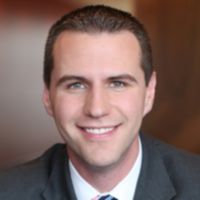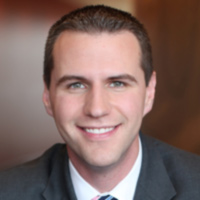Retirees Could Face a Perfect Storm of Financial Concerns
Are you taking on more risk than you should in retirement?


Profit and prosper with the best of Kiplinger's advice on investing, taxes, retirement, personal finance and much more. Delivered daily. Enter your email in the box and click Sign Me Up.
You are now subscribed
Your newsletter sign-up was successful
Want to add more newsletters?
There’s a line from the movie The Perfect Storm that pretty much sums up how many Baby Boomers are feeling about their nest eggs right now.
“Skip, what are we gonna do about those numbers? They suck.”
Of course, Mark Wahlberg was talking to George Clooney about fish, not finances. Still, it’s hard not to relate to the desperate crew of the Andrea Gail, who simply were hoping to hold on to a lifestyle they loved.
From just $107.88 $24.99 for Kiplinger Personal Finance
Become a smarter, better informed investor. Subscribe from just $107.88 $24.99, plus get up to 4 Special Issues

Sign up for Kiplinger’s Free Newsletters
Profit and prosper with the best of expert advice on investing, taxes, retirement, personal finance and more - straight to your e-mail.
Profit and prosper with the best of expert advice - straight to your e-mail.
More and more retirees and soon-to-be retirees are venturing into uncertain seas these days. And they, too, may be taking on more risk than they should in pursuit of higher yield.
Individuals are rolling to and through retirement in search of something they can put their money into without having to worry about the bottom dropping out. But the options are limited. The certificates of deposit and money market funds that used to be the go-to for safe savers don’t make much sense anymore. A fund that offered 5% before the financial meltdown in 2008 might offer 1.05% now. If you’re lucky. (The current inflation rate for the 12 months ended in May 2017 is 1.9%, according to the U.S. Labor Department.)
The yield on 10-year Treasury notes, another lower-risk alternative – and one that has shown some correlation with the nation’s economic outlook – also keeps slipping.
The economy has improved, of course, since the government began its efforts to turn things around after the 2008 crisis – cutting the federal funds rate to nearly zero and implementing quantitative easing programs to increase the money supply.
But interest rate hikes since then haven’t been as high or as often as projected. The Fed is being cautious; it doesn’t want to stop a good thing. But its prudence has affected some retirees. If, for example, you had $1 million in CDs in 2007, at 5% interest, you’d get $50,000 each year in income. You could live off that pretty comfortably, along with your Social Security and maybe a pension.
Today, the income stream would be about $10,000 – pushing many to turn to more unstable financial vehicles, and to stick with them longer, to make up the difference.
So there’s that. And then there’s the good/bad problem facing all retirees today: You’re likely going to live longer than you thought. According to the Social Security Administration, a man reaching age 65 today can expect to live, on average, to age 84.3. A woman turning age 65 today can expect to live, on average, to age 86.6.
Remember, that’s the average. The Centers for Disease Control and Prevention reports the U.S. had 72,197 centenarians as of 2014, a 44% increase since 2000. By 2050, the U.S. is expected to have 1 million Americans age 100 or older.
And the longer you live, the longer your money will have to last.
When Social Security was initiated in 1935, the average life expectancy was much lower than today. When your grandpa collected his gold watch in the 1970s, took his pension and went home with plans to golf and travel, he might make it another 13 or 14 years.
You and your Baby Boomer crew, on the other hand, can expect to be retired for nearly as long as you worked.
Then there’s the matter of your health. People are living longer in large part because of improvements in medical care. But those improvements come at a cost that could affect the sturdiest of retirement plans.
The older you get, the more likely you’ll need prescription and over-the-counter drugs. Your eyes and teeth are likely to need work, and you may have to pay for Medicare supplements and co-pays to help pay some of the medical costs that original Medicare does not cover. According to a 2016 Fidelity report, the average couple retiring at 65 will need $260,000 to cover their medical expenses through retirement.
And we can’t forget the ever rising costs of long-term care. If you’re 65 today in the United States, there’s a 70% percent chance you’re going to need some kind of long-term care during your life, according to the U.S. Department of Health and Human Services.
Unfortunately, those costs keep going up. The “Genworth 2016 Cost of Care Study” found that the national median cost of long-term care rose across all settings but one – adult day care. The median cost of a semi-private room in a nursing home last year was $6,844 a month. And Medicare generally doesn't cover long-term stays in a nursing home.
There’s never been a more important time to have a comprehensive retirement plan, and yet many Baby Boomers have avoided it. (A 401(k) plan plus a checking account does not equal a plan.) So, you have some work to do:
- You may want to stay employed and save longer than you originally predicted.
- You also should take life expectancy into consideration when you and your spouse talk about filing for Social Security.
- And you’ll probably want to put some strategies in place to increase the steady and reliable income you need in retirement, especially if you’re one of the increasing number of American workers without an employer pension plan.
Retirement is supposed to be filled with sunny days, happy times and lots and lots of relaxation. If your future seems to be foundering, talk to a financial professional about charting a plan that could help put you on calmer seas.
Kim Franke-Folstad contributed to this article.
Profit and prosper with the best of Kiplinger's advice on investing, taxes, retirement, personal finance and much more. Delivered daily. Enter your email in the box and click Sign Me Up.

Drew Jones is a Registered Financial Consultant with The Lloyd Group Inc., based in Suwannee, Ga., where he specializes in coaching clients to help them pursue their financial goals. He has a bachelor's degree in finance from the University of Georgia's Terry College of Business and has extensive knowledge in portfolio analysis and managing risk. Drew is also licensed to sell insurance.
-
 Americans, Even With Higher Incomes, Are Feeling the Squeeze
Americans, Even With Higher Incomes, Are Feeling the SqueezeA 50-year mortgage probably isn’t the answer, but there are other ways to alleviate the continuing sting of high prices
-
 Hiding the Truth From Your Financial Adviser Can Cost You
Hiding the Truth From Your Financial Adviser Can Cost YouHiding assets or debt from a financial adviser damages the relationship as well as your finances. If you're not being fully transparent, it's time to ask why.
-
 How to Manage a Disagreement With Your Financial Adviser
How to Manage a Disagreement With Your Financial AdviserKnowing how to deal with a disagreement can improve both your finances and your relationship with your planner.
-
 Are You Honest With Your Financial Adviser? Why Hiding the Truth Can Cost You
Are You Honest With Your Financial Adviser? Why Hiding the Truth Can Cost YouHiding assets or debt from a financial adviser damages the relationship as well as your finances. If you're not being fully transparent, it's time to ask why.
-
 5 Actions to Set Up Your Business With Your Exit in Mind, From a Wealth Adviser
5 Actions to Set Up Your Business With Your Exit in Mind, From a Wealth AdviserWhen you're starting a business, it may seem counterintuitive to begin with exit planning. But preparing will put you on a more secure footing in the long run.
-
 Missed Your RMD? 4 Ways to Avoid Doing That Again (and Skip the IRS Penalties), From a Financial Planner
Missed Your RMD? 4 Ways to Avoid Doing That Again (and Skip the IRS Penalties), From a Financial PlannerIf you miss your RMDs, you could face a hefty fine. Here are four ways to stay on top of your payments — and on the right side of the IRS.
-
 What Really Happens in the First 30 Days After Someone Dies (and Where Families Get Stuck)
What Really Happens in the First 30 Days After Someone Dies (and Where Families Get Stuck)The administrative requirements following a death move quickly. This is how to ensure your loved ones won't be plunged into chaos during a time of distress.
-
 AI-Powered Investing in 2026: How Algorithms Will Shape Your Portfolio
AI-Powered Investing in 2026: How Algorithms Will Shape Your PortfolioAI is becoming a standard investing tool, as it helps cut through the noise, personalize portfolios and manage risk. That said, human oversight remains essential. Here's how it all works.
-
 A Newly Retired Couple With a Portfolio Full of Winners Faced a $50,000 Tax Bill: This Is the Strategy That Helped Save Them
A Newly Retired Couple With a Portfolio Full of Winners Faced a $50,000 Tax Bill: This Is the Strategy That Helped Save ThemLarge unrealized capital gains can create a serious tax headache for retirees with a successful portfolio. A tax-aware long-short strategy can help.
-
 5 Retirement Myths to Leave Behind (and How to Start Planning for the Reality)
5 Retirement Myths to Leave Behind (and How to Start Planning for the Reality)Separating facts from fiction is an important first step toward building a retirement plan that's grounded in reality and not based on incorrect assumptions.
-
 I'm a Financial Adviser: Silence Is Golden, But It Hurts Your Heirs More Than You Think
I'm a Financial Adviser: Silence Is Golden, But It Hurts Your Heirs More Than You ThinkTalking to heirs about transferring wealth can be overwhelming, but avoiding it now can lead to conflict later. Here's how to start sharing your plans.